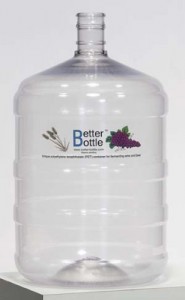Plastic vs Glass Carboy II, The Revenge
 A couple weeks ago I posted about my issue with plastic carboys. As it turned out there are a lot of people who firmly believe that plastic is just as good if not better. I received a ton of comments and suggestions of how to treat the plastic carboys. Believe it or not I actually listened to and tried out. Here are my new thoughts on Plastic Carboys:
A couple weeks ago I posted about my issue with plastic carboys. As it turned out there are a lot of people who firmly believe that plastic is just as good if not better. I received a ton of comments and suggestions of how to treat the plastic carboys. Believe it or not I actually listened to and tried out. Here are my new thoughts on Plastic Carboys:
- Cleaning them is a synch with a 1/2 scoop of oxy clean and a 24 hours soak. I had no problem with the 3 or 4 batches I’ve brewed using the plastic carboys in the last couple of weeks
- The light weight and “Non-breakable” carboy is very easy to work with.
- The 6 gallon size is no longer an issue. With a couple drops of fermcap, the krausen is kept in check.
- Had an issue lagering with the plastic deforming and sucking the star san from the air lock into the carboy.
- I’m Still not sure about long term fermentation, 6+ months in a carboy. Will the plastic allow oxygen to get into the beer?
My only real problem now I have with plastic is the longterm fermentation of strong beers and sours. Does the Plastic leach oxygen, does it stain, and will the bacteria embed itself into the plastic? Does anyone have any personal experience with this?
I think for me for me I have no problem doing 95% of my primary fermentation in plastic. For secondary I think I’m leaning more toward glass but wouldn’t have a problem using plastic if all my glass carboys were occupied. But for sours and longterm fermentation of strong beers, I’m going to stick to glass.


I don’t think you need to worry about oxygen and sour beers with regards to plastic carboys. Most pro brewers doing sours age them in oak barrels which allows a lot more oxygen in than the better bottle will. I have 2 barrels I use for sours and have also not noticed any oxidation problems. I have aged a sour pale and a couple of fruited lambics for nearly a year in plastic and not had any problems either.
As for non-sours, I have never aged anything longer than 4 weeks or so (dopplebock and imperial stout) in plastic (or glass for that matter) before moving it to a keg so I can’t speak to the effects on those beers. I have, however, had an imperial stout in a whiskey barrel for about 6 months and didn’t have any oxidation issues. I think the whole O2 in plastic thing is overblown and not really a big deal.
If the plastic is scratched there is the possibility that some bacteria could get in there and be missed by the sanitizer. Once I use a plastic vessel for a sour, I generally dedicate that one as sour only just in case. Plastic scratches pretty easily.
Thanks for the feedback Dan. I’m glad you haven’t found any oxidation issues.
According to the Better Bottle website, popping the bung on a carboy to take a sample will introduce more oxygen than will leech through the walls of the carboy over a year. I have yet to hear any real evidence or results from a controlled experiment that show that a plastic carboy will oxidize your beer, sour or clean.
Personally, I have 9 sours currently sitting in better bottles. I am planning to dedicate these carboys to sours permanently, but I would probably do the same with glass, just in case. I also have only aged a clean beer as long as a few months in plastic, mainly because I believe long-term bulk aging is unnecessary if you have a strong fermentation (proper pitching rate, well aerated, proper temp control), and I prefer to do any aging of big beers in the bottle.
As you might have guessed, Im a big proponent of plastic. IMO, the advantages far outweigh the disadvantages.
Awesome Matt. After my rocky start with Better Bottles, I’m becoming a fan. With all the great tips, feedback and personal experiences people have left, there seem to not be a whole lot of negatives with Better Bottle. I’m glad I put up these posts. Hopefully they have helped others as well.
I will be one more proponent of Better Bottles for long term aging of sours. I don’t have a ton of experience, but with my few batches, the beer aged for 14 months in the Better Bottle was much more complex. The bottle was stained a bit but this bottle is dedicated to my yearly Flanders Red so it is not a concern.
I also remember Mike T at the Mad Fermentalist agreeing that Better Bottles are a good option for long term aging of sours.
Thanks for the insight Jeff. A lot of good feedback about BB!